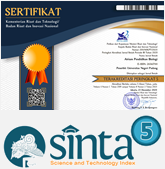Influence Learning Model Predict Discuss Explain Observe Discuss Explain (PDEODE) Literacy of Science Literacy Against Learning Competencies Learners on Biology Subjects Class X SMAN 1 2x11 Kayutanam
Abstract
This research is based on the low competence of biology learners learners. Factors that affect the low competence of learners learning is the process of learning by teachers and learners in the classroom is still centered on the teacher, the lack of interaction between students with teachers, and learning competence of learners has not been achieved in accordance with minimal mastery criteria (KKM). The purpose of this research is to know the influence of predictor learning model explain explain observe discuss explain (PDEODE) containing science literacy to learners' competence in the subjects of biology class X SMAN 1 2X11 Kayutanam. This research is a quasi experimental research with randomized control group design posstest only design. Sampling from population using purposive sampling technique that class X1 as experiment class and class X3 as control class. The data analysis technique used to test the hypothesis is t test. Learning competencies analyzed are learning competence in the cognitive, affective, and psychomotor aspects with environmental change materials. The results showed that the average value of posstest learning competence on the cognitive, affective and psychomotor aspects of the experimental class students higher than the control class. So it can be concluded that the application of predictor learning explain explain observe discuss explain (PDEODE) model of science literacy improves the cognitive, affective, and psychomotor learners' competence in the material of environmental change.
Full Text:
FullpaperReferences
Costu, Bayram. 2008. “Learning Science through the PDEODE Teaching Strategy: Helping Students Make Sense of Everyday Situation”. Eurasia Journal of Mathematic, Science & Technology Education, 2008, 4(1), 3-9.
Friatma, Ayunda, Helendra, & Syamsurizal. (2017). Analisis Kualitas Soal Ujian Akhir Semester Genap Mata Pelajaran Biologi Kelas XI IPA SMA Negeri Wilayah Selatan Kabupaten Solok Tahun Pelajaran 2015/2016. Bioeducation Journal, 1(2), 50-67.
Kolari, S. Ranne, C.S. 2003. Promoting the Conceptual Understanding of Engineering Students Through Visualisation. Global Journal of Engineering Education.
Kolari, S. Ranne, S. S.,& Tiili, J. 2005. Enhancing Engineering Students’ Confidance
Using Interactive Teaching Methods – Part2: Post-test Result for the Force
Concept Inventory Showing Enhanced Confidance. World Transactions on Engineering and Technology Education.
Kurniasih, Imas & Berlin Sani. 2016. Revisi Kurikulum 2013 Implementasi Konsep dan Penerapan. Surabaya: Kata Pena.
Lufri. 2010. Strategi Pembelajaan Biologi. Padang: UNP Press.
Majid, Abdul. 2013. Strategi Pembelajaran. Bandung: PT Remaja Rosdakarya.
Novidsa, Syamsurizal, dan Darussyamsu, Rahmawati. 2017. “Peningkatan Kompetensi Sikap Peserta Didik dengan Penerapan Strategi Learning Community Melalui Model Pembelajaran inkuiri pada Materi Struktur dan Fungsi Jaringan Tumbuhan Kelas VIII di SMPN 12 Padang”. Bioeducation Journal (Vol.1 No 2). Hlm 91.
Septiani, Syamsurizal, dan Darussyamsu, Rahmawati. 2017. ”Peningkatan Kompetensi Keterampila Peserta Didik dengan Penerapan Startegi Learning Community melalui Model Pembelajaran Jigsaw pada Materi Sistem Pencernaan Manusia Kelas VIII di SMPN 12 Padang”. Bioeducation Journal (Vol.1 No 2). Hlm 122.
Sudarmi,dkk. 2012. Pengaruh model pembelajaran PDEODE terhadap hasil belajar IPA siswa kelas IV SD di gugus V kecamatan seririt. Singaraja indonesia: Universitas pendidikan ganesha.
Sudaryono. 2012. Dasar-dasar Evaluasi Pembelajaran. Tanggerang: Graha Ilmu.
Warsono. 2012. Pembelajaran Aktif. Bandung: Remaja Rosdakarya Offset.
Yamin, M. 2012. Startegi Pembelajaran Berbasis Kompetensi. Jakarta: GP Press Group.
Yuliati, Yuyu. 2017. “ Literasi Sains dalam Pembelajaran IPA.” Ilmu Pendidikan. Universitas Majalengka. Vol 3 no 2. Majalengka: Universitas Majalengka.
DOI: http://dx.doi.org/10.24036/apb.v3i1.4555
DOI (Fullpaper): http://dx.doi.org/10.24036/apb.v3i1.4555.g2716




